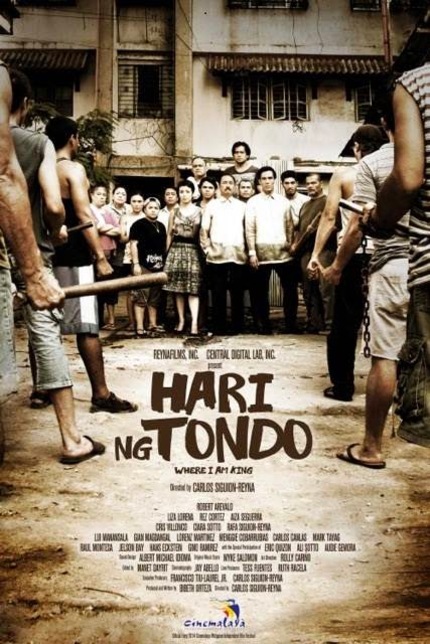Cinemalaya 2014: Carlos Siguion-Reyna's HARI NG TONDO (WHERE I AM KING), A Crowdpleaser With Some Semblance Of Substance

The first movie is the one written by Bibeth Orteza, which was followed faithfully by Siguion-Reyna. Orteza is a veteran screenwriter whose most recent works are television sitcoms or sitcom-like crowd drawers like Nobody Nobody but Juan (Eric Quizon, 2009), Si Agimat at si Enteng Kabisote (Tony Y. Reyes, 2010), and My Little Bossings (Marlon Rivera, 2013). Her best scripts, however, are the ones directed by Siguion-Reyna, like Ligaya ang Itawag Mo Sa Akin (Call Me Joy, 1997), Ang Lalaki sa Buhay ni Selya (The Man in Her Life, 1997), and Kahapon, May Dalawang Bata (Yesterday Children, 1999). Her collaborations with Siguion-Reyna possessed a certain quality that seems oblivious to the obvious commercial leanings of most of her work as mercenary writer for television and movie studios.
Hari ng Tondo however feels like an anomaly in Orteza's filmography. It is neither this nor that. It isn't empty slapstick. It also isn't serious drama. The story is about a grandfather (Robert Arevalo) who is on the verge of bankruptcy but opts to bring his grandchildren (Rafael Siguion-Reyna and Cris Villonco) to indigence-filled Tondo to teach them the toughness that got him through life. While the story posits various themes that would merit further discourse, Orteza never fully fleshes them out and instead gambles on easy comedy and lazy plot devices, probably culled from all the years she toiled making the masses laugh. The result is a movie that is middlebrow but undeniably entertaining. There is really nothing wrong with that.
Hari ng Tondo works quite well as a crowd-pleaser. Its eccentric mix of toilet humor, popcorn musicality, familiar family drama, and skin-deep social commentary is actually enjoyable the very same way a lot of the better-made consumable fare available on television is enjoyable. In its effort in manufacturing mainstream charms, it tends to dangerously tread the very thin line that separates good and bad taste, such as when a character's speech impediment is initially played for laughs or the film's various depictions of the titular neighborhood's trademark squalor. In the end though, the movie Orteza has written and Siguion-Reyna has so faithfully rendered earns its redemption because of its sheer earnestness.
The second movie is the one that is more subtly told, veiled to the point of obscurity by the film's more pedestrian concerns. It is the movie that still follows the trajectory of Orteza's screenplay, but bolstered by the stirring performance of Arevalo as a man with certain delusions about the neighborhood where he grew up. The character Arevalo inhabits is adamant that the glories Tondo has persist up to the present. His return to Tondo, while depicted as humorously as possible, ends up with him waking up to reality that glories fade and virtues dissipate.
As a character study of a man who has risen in status and wealth but forced by a sudden reversal of fortune to reconcile how much he and his childhood home have changed, Hari ng Tondo at least gains further footing beyond its tentative populist charms. There is genuine heartbreak in seeing Arevalo's stalwart believer of Tondo's illustrious history collapse amidst the bleak ruin that is his locale has been reduced to. The gap between himself and his beloved Tondo which he has feigned ignorance of for decades is as real as the rot and garbage that surround him.
It is clear that Hari ng Tondo was crafted to be entertaining, especially with its blend of implausible plotting and low-rent gloss. Siguion-Reyna and Orteza may have overdone the kitsch and artifice, but the movie still remains to be authentically amusing. Discreetly, the movie attempts to dig deep by establishing Arevalo's character as trapped in an era of noble heroics when he is in fact living in a sad age of corruption.
Oggs Cruz
contributed to this story.

Do you feel this content is inappropriate or infringes upon your rights? Click here to report it, or see our DMCA policy.






